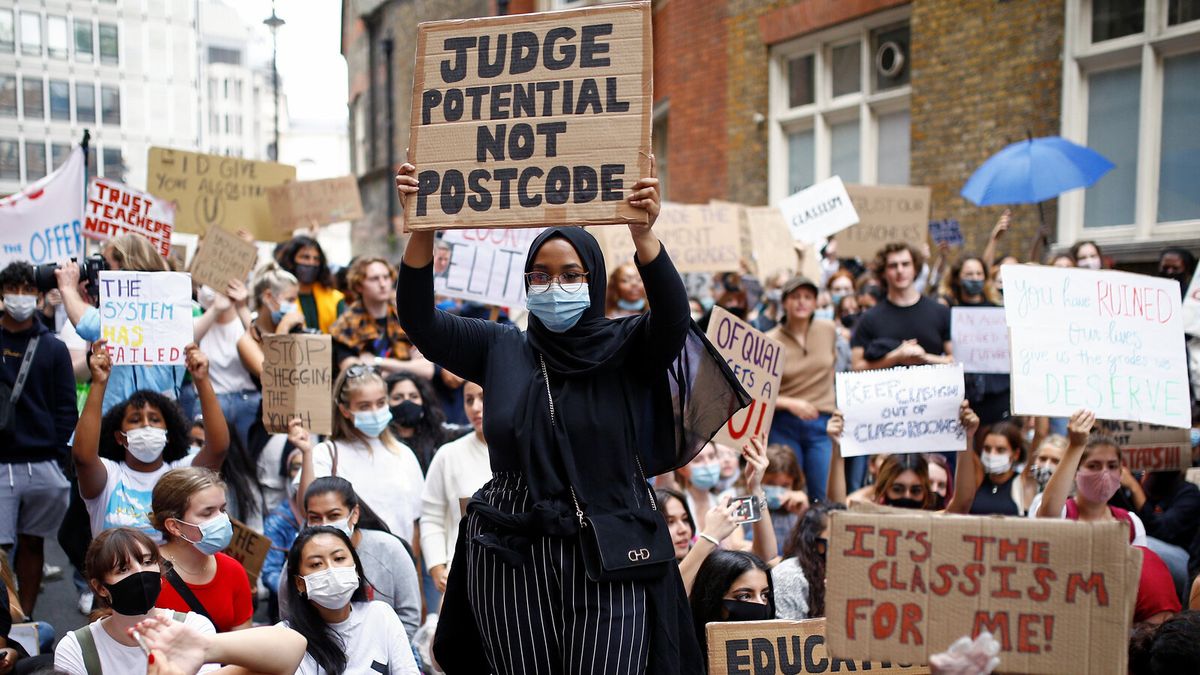The UK government’s mishandling of student exams has undermined faith in the education system

A few minutes every morning is all you need.
Stay up to date on the world's Headlines and Human Stories. It's fun, it's factual, it's fluff-free.
While schools in the United States are grappling with how they’ll safely reopen for the fall semester, the British education system is facing its own coronavirus-related crisis. A decision to downgrade the grades of nearly 40% of the country’s students has led to a nationwide backlash and protests from students who’ve seen their academic futures upended by a bureaucratic decision.
Every year, millions of 17- and 18-year-old students take tests to determine which universities and professional programs they will attend. For most of these students, this is a two-year process that directs the path of their future careers. But in a year already disrupted by the COVID-19 pandemic, the government’s exam decision has made things even more uncertain.
The United Kingdom’s unusual school year
As with so many things this year, the current situation began with the COVID-19 pandemic. In March, as the first wave was sweeping across Europe, the UK opted to close its schools indefinitely. The closures, announced by Prime Minister Boris Johnson, affected around eight million students across the nation.
In addition to the school closures, the nation’s General Certificate of Secondary Education (GCSE) and Advanced Level (A-level) exams were canceled. Normally the exams, which determine if a student is accepted into specific universities and professional training programs, would have been held in May and June. They generally follow two years of study and preparation.
Due to these dramatic changes, the Office of Qualifications and Examinations Regulation (Ofqual), the exam “watchdog” for the UK, adapted its standards. The office said in an April 3 announcement that it had worked to “develop a process which fairly recognises students’ work and makes sure they get their grades in time to progress.”
In lieu of no exams, the schools and teachers were asked to provide “fair, objective and carefully considered judgements of the grades schools and colleges believe their students would have been most likely to achieve if they had sat their exams.”
The Tories downgrade students
The current government is led by the Conservative Party – more commonly known as the Tories – and Prime Minister Johnson, who was admitted to intensive care in April after contracting COVID-19. The goodwill Johnson engendered after successfully overcoming the virus may have been extinguished in the wake of his government’s decision to lower the grades received by students.
The government’s decision was in response to higher-than-usual grades for this year’s crop of students under the Ofqual’s adapted grading process. It was the stance of the government that teachers had “inflated” the grades of their students.
To correct for this inflation, the government used a computer algorithm to adjust scores down. The algorithm used mock exam scores and the previous year’s results for schools to determine what the government insisted was more accurate scores.
Unfortunately, for more than a third of A-level students, that meant a downgrade of their final scores. Students who had previously received a sufficient score to be admitted to the universities of their choice had suddenly fallen short. Even with successful appeals, it was too late in the year for many students who lost their place at schools like Oxford and Cambridge to be admitted for the year.
Adding both a race and class component to the situation, students who were wealthier or attending private schools were largely unaffected by the algorithm. Instead, the downgrade was experienced disproportionately by the more racially diverse students of the free state schools.
A-level students protest
In the wake of the government’s decision, London, Liverpool and other major cities were host to multiple days of student-led protests. The protesters advocated that grades be restored to those previously determined by the schools. An Instagram account dedicated to the protests, aleveluturn, called the adjusted results “classist.”
The “A-level U-turn” protest organizers urged students to send a letter to their Member of Parliament (MP), which stated in part, “The government’s system of treating students as statistics on a spreadsheet rather than individuals has created a powerful sense of mistrust, betrayal and injustice among young voters.” It went on to add:
“While the algorithm-generated grades may have produced overall result distributions which are consistent with historical averages, at an individual level many students have been discriminated against due to their school’s past performance and class sizes. This is fundamentally unjust.”
The government’s U-turn
In response to the protests and anger, the Tory government backtracked on its decision, saying the grades would now be based on the teachers’ assessment. For most students, however, the “humiliating U-turn,” as some in the media called it, had little effect. University placement decisions had already been made for the year.
Johnson was roundly criticized for taking a vacation in the midst of the political fiasco without publicly addressing it.
The fiercest criticism for the situation, though, has been aimed at the UK’s education secretary, Gavin Williamson, another member of the Conservative Party. Williamson has been under fire from head teachers (school directors) from around the country, both for his handling of the exam scores and for providing insufficient guidance for schools looking to reopen amid the ongoing pandemic.
Even the UK’s right-leaning press, including the Daily Mail, took shots at Williamson, calling him a “clown” and a “moron.”
Have a tip or story? Get in touch with our reporters at tips@themilsource.com




Comments ()